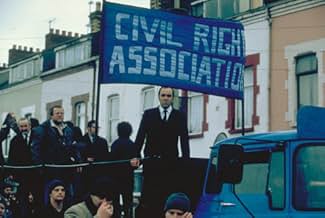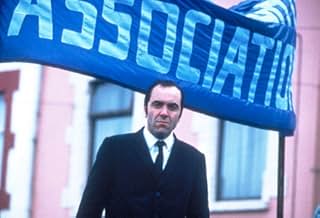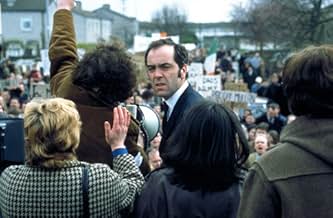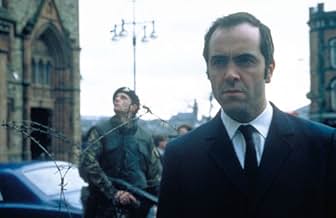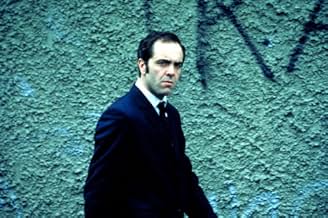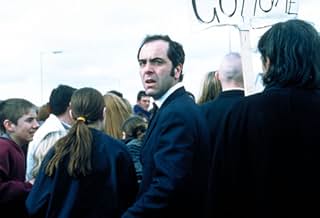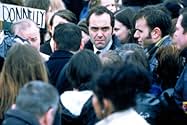Una drammatizzazione della marcia di protesta per i diritti civili irlandesi e il successivo massacro delle truppe britanniche il 30 gennaio 1972.Una drammatizzazione della marcia di protesta per i diritti civili irlandesi e il successivo massacro delle truppe britanniche il 30 gennaio 1972.Una drammatizzazione della marcia di protesta per i diritti civili irlandesi e il successivo massacro delle truppe britanniche il 30 gennaio 1972.
- Ha vinto 1 BAFTA Award
- 19 vittorie e 23 candidature totali
- Bridget Bond
- (as Carmel Mccallion)
- Maj. Steele
- (as Chris Villiers)
Recensioni in evidenza
The acting, especially James Nesbit is excellent, the recreation of the mood is superb although it was obvious with the constant close ups that there was very little budget to recreate the scenery. The geography was never explained and therefore would leave a viewer without prior knowledge of the area disorientated.
The documentary suffered from not being able to set the scene, a lot had happened in the week prior to the Civil Rights march that put both the participants and the security forces on edge and made the advance more significant. The question of why the Paras were sent to Derry were never fully explored.
Overall it was flawless recreation of events from the point of view taken by the film makers on this particular incident. It is worth noting that this is based on the Irish Governments review of the Widgery report into Bloody Sunday. (NB the Widgery report is mostly considered by nationalists to be a white wash)
But for an American audience with no benefit of subtitles for the brogues and working class Brit accents, no explanations outside of eventual context for lingo and slang (it took me awhile to keep track of "provos" vs "paras"), the quasi-documentary, in-your-face approach takes on a tragic universality.
It could be part of a Cassandra trilogy with `Black Hawk Down' and `No Man's Land' about why military should not be in charge in urban strife, whether as "peacekeepers" or in civil wars or regime changes, no matter how heinous the regime to be changed. A lesson for the Baghdad invasion planners?
Cities are complicated social ecologies, and the film shows a great diversity of attitudes and pressures on all sides, managing to be both clinical in meticulous detail and visceral in shocking impact. The film is probably not objective about the British (I don't think it's a coincidence that the imperious Brit "observer" who takes repugnant charge is played by Tim Pigott-Smith who was a similar colonialist in `The Jewel in the Crown.") A central universal image becomes the awesome power of rock-throwing, unemployed teen-age boys to spark war.
The liberals in the middle, clinging to dreams of Gandhi, Martin Luther King, and fair community relations, are morally destroyed over the course of a few hours and the extremists with guns on both sides feed on each other in perpetual destruction like the ouroboros image of the snake eating itself. I kept feeling I missed the exact flash point in a wandering attention moment and wanted to immediately re-watch it to see if I could track the gotcha! moment when escalation could have been prevented, so I look forward to this being available on video tape.
But the film does clearly show that it was attitudes that created the violent outcome and consequent government non-investigation, as we see in so many police situations. Once soldiers enter a city it is a police situation with all those complexities.
I know James Nesbitt primarily from frothy Irish comedies, like `BallykissAngel,' so his staggering portrayal of the M.P. in the middle is a revelation, as he goes from planning a civil rights march to pleading with his girlfriend to physical heroism to a break-down in shock.
The version of the titular U2 song played out at the end, running well past the credits finish, is a moving, live, passionate audience sing-along where Bono shouts out other locales that have experienced similar situations to emphasize the universality.
Now I learned about this in school for a while and as an Englishman I do feel a certain, oblique connection to the troubles. I didn't realise this kind of thing could happen among my compatriots (I'm not trying to belittle Irish Nationalism by calling the Northern Irish my compatriots, it's just how I have come to see them), and I hadn't realised I'd thought this way. It was a real consciousness raiser for me.
My biases notwithstanding, this movie is as a hypnotic account of a confusing episode of an even more confusing time. It has the task of representing the mindset of the times, the mindsets, I should say, while still making it into a spontaneous narrative.
I'm not an expert so I cannot vouch for the authenticity of any of this, but I feel I can believe all of it. There is a tendency for us to demarcate history from real life. A million deaths is a statistic as Stalin said. But here I really feel history and the lives of regular people converge in a devastating way.
At its heart I suppose the movie is a mystery. Not so much who-done-it but a why-did-it. I really felt while I was watching, all the chaos and threat that leads to tragedy while still feeling baffled and disorientated throughout. It feels like a documentary. The dialogue is spontaneous but still rich with nuance. The cinematography is candid and even shaky, giving it an often hypnotic, Blair Witch quality.
A movie to never forget.
Lo sapevi?
- QuizTo make this movie as authentic as possible, no lights were used in the movie and the camera work was entirely hand-held
- BlooperThe marchers carry homemade cardboard signs with slogans written on them. When shown from behind, some have modern printing ("Made in China") on them that are not appropriate for 1972.
- Citazioni
Ivan Cooper: I just want to say this to the British Government... You know what you've just done, don't you? You've destroyed the civil rights movement, and you've given the IRA the biggest victory it will ever have. All over this city tonight, young men... boys will be joining the IRA, and you will reap a whirlwind.
- Curiosità sui creditiThe live rendition of U2's Sunday, Bloody Sunday continues to play for a full three minutes over a black screen after the credits finish rolling.
- ConnessioniFeatured in The 2003 IFP Independent Spirit Awards (2003)
I più visti
Dettagli
- Data di uscita
- Paesi di origine
- Lingua
- Celebre anche come
- Domingo sangriento
- Luoghi delle riprese
- Aziende produttrici
- Vedi altri crediti dell’azienda su IMDbPro
Botteghino
- Budget
- 2.000.000 £ (previsto)
- Lordo Stati Uniti e Canada
- 773.228 USD
- Fine settimana di apertura Stati Uniti e Canada
- 29.419 USD
- 6 ott 2002
- Lordo in tutto il mondo
- 1.758.689 USD
- Tempo di esecuzione1 ora 51 minuti
- Colore
- Mix di suoni
- Proporzioni
- 1.85 : 1
Contribuisci a questa pagina


